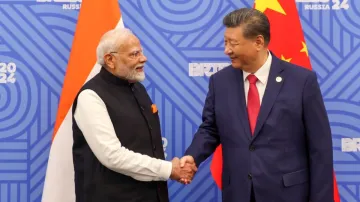Beijing: The "successful" meeting between Prime Minister Narendra Modi and President Xi Jinping in Russia in October "signified a new beginning" of India-China relations, a senior minister of the ruling CPC has said. Liu Jianchao, Minister of the International Department of the Chinese Communist Party of China (CPC) was referring to the Modi-Jinping meeting at Kazan in Russia on the sidelines of the BRICS summit in Russia while speaking with the Indian envoy to China, Pradeep Kumar Rawat, on Tuesday, official media said on Wednesday.
China is willing to engage with all political parties in India
The restarting of China-India relations meets the fundamental interests of the 2.8 billion people of the two countries, corresponds to the common expectations of the Global South and is also in line with the correct direction of history, he said. Liu said China is willing to strengthen friendly exchanges with all political parties in India, jointly implement the important consensus reached by leaders of the two countries, and promote the early return of bilateral relations to a stable and healthy development track.
PM Modi-Xi bilateral meeting
Notably, PM Modi and Xi met at Kazan on October 24 after the two countries reached an agreement to end the over four-year military standoff at Eastern Ladakh during which the relations between the two countries were virtually frozen. During their meeting, their first in five years, the two leaders endorsed the agreement on patrolling and disengagement along the LAC in eastern Ladakh and instructed the Special Representatives for the boundary mechanism to meet to discuss further steps.
After their meeting, External Affairs Minister S Jaishankar and his Chinese counterpart Wang Yi met on the sidelines of the G20 summit in Brazil followed by the Working Mechanism for Consultation & Coordination on China-India Border Affairs (WMCC).
Later in November, Defence Minister Rajnath Singh held a crucial meeting with his Chinese counterpart Admiral Dong Jun in Vientiane, Lao PDR, where he expressed the two countries should avoid the Galwan Valley-like clash. The Indian Defence Minister underscored the fact that amicable relations between India and China, the two largest nations in the world, would have positive implications for global peace and prosperity. Considering that both countries are and will continue to remain neighbours, he mentioned that “we need to focus on cooperation rather than conflict”. He emphasised and looked forward to greater trust and confidence building between the two sides through de-escalation. Both sides agreed to work together towards a roadmap for rebuilding mutual trust and understanding.
(With inputs from agency)
ALSO READ: 'Consensus includes patrolling, grazing in traditional areas': Rajnath on India-China border pact
Latest World News
